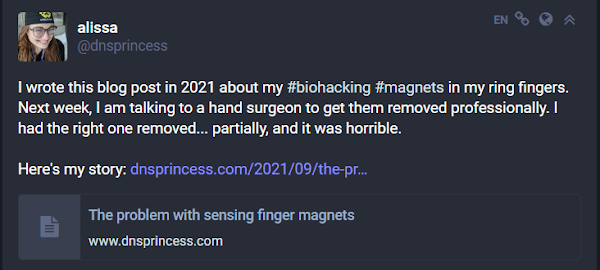With @dnsprincess having their sensing magnets removed let's discuss what MAY have led to failure and what MAY lead to future successes...
@dnsprincess@infosec.exchange
Let's recap...
In November 2016, Alissa (@dnsprincess) had a set of sensing magnets implanted in their fingertips. October 2021, five years later, one of the magnets was removed - partially. November (huh) 2022 and both magnets will potentially soon be removed. Womp womp.
But why? Let's speculate!
In the original post, they recommended against attempting to 're-stimulate' an implanted magnet - using a stronger magnet to manipulate an implanted magnet. The theory was that this would break down the scar tissue that had formed. One of the questions at the time was whether the coating (silicone) had broken. The answer was yes.
Center Left: Magnetic Core;
Center Right: Separate Silicone Coating
While the intention of breaking down scar tissue via the manipulation of the magnet was sound the unintended consequence of this was the failure of the silicone encapsulation - mechanical failure due to over-manipulation. While it's easy to look at the silicone and see the inherent weakness in the material a note should be made that in 2016 these magnets were one of the only options. They weren't an off-the-shelf solution but they were crafted by someone in the body mod industry with experience; Essentially a more knowledgeable person's DIY project. These magnets are still for sale and are STRONGLY ADVISED AGAINST!
Note: <agnets from here out have not been removed and are still successfully implanted.
My fingertip magnet is coated with what I believe is a series of body-compatible resins. This implanted magnet was created by a biohacking community member trained in medicine. As of today 12/8/2022, I've had fantastic success with this magnet. Durability being the main benefit of resin encapsulation over silicone. The added hardness of resin prevents the magnet itself from weakening the structural integrity of the coating. Failure of the coating leading corrosion and eventual rejection.
'Pellucid' Resin Coated Sensing Magnets
Titanium Plasma Welded Sensing Magnet
There have been a number of other sensing magnets available but the takeaway here is that there's an evolution in sensing magnets happening. While I won't be making any recommendations right now as to which magnet someone should get I can strongly recommend against silicone. Hopefully in the future @dnsprincess will be able to provide updates regarding the removal of their magnets. In the meantime keep an eye out for more biohacking content!





Comments
Post a Comment